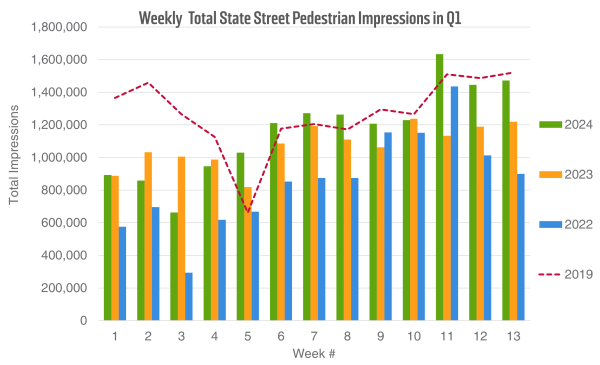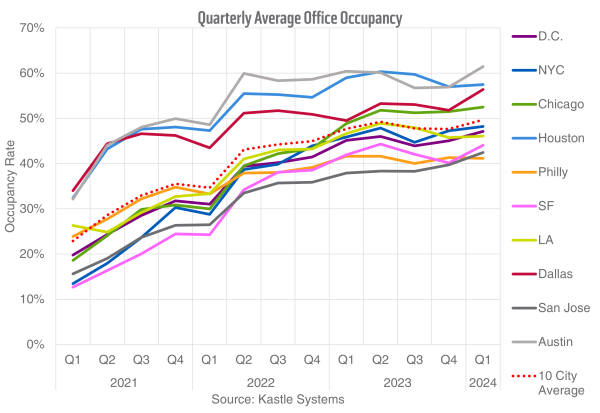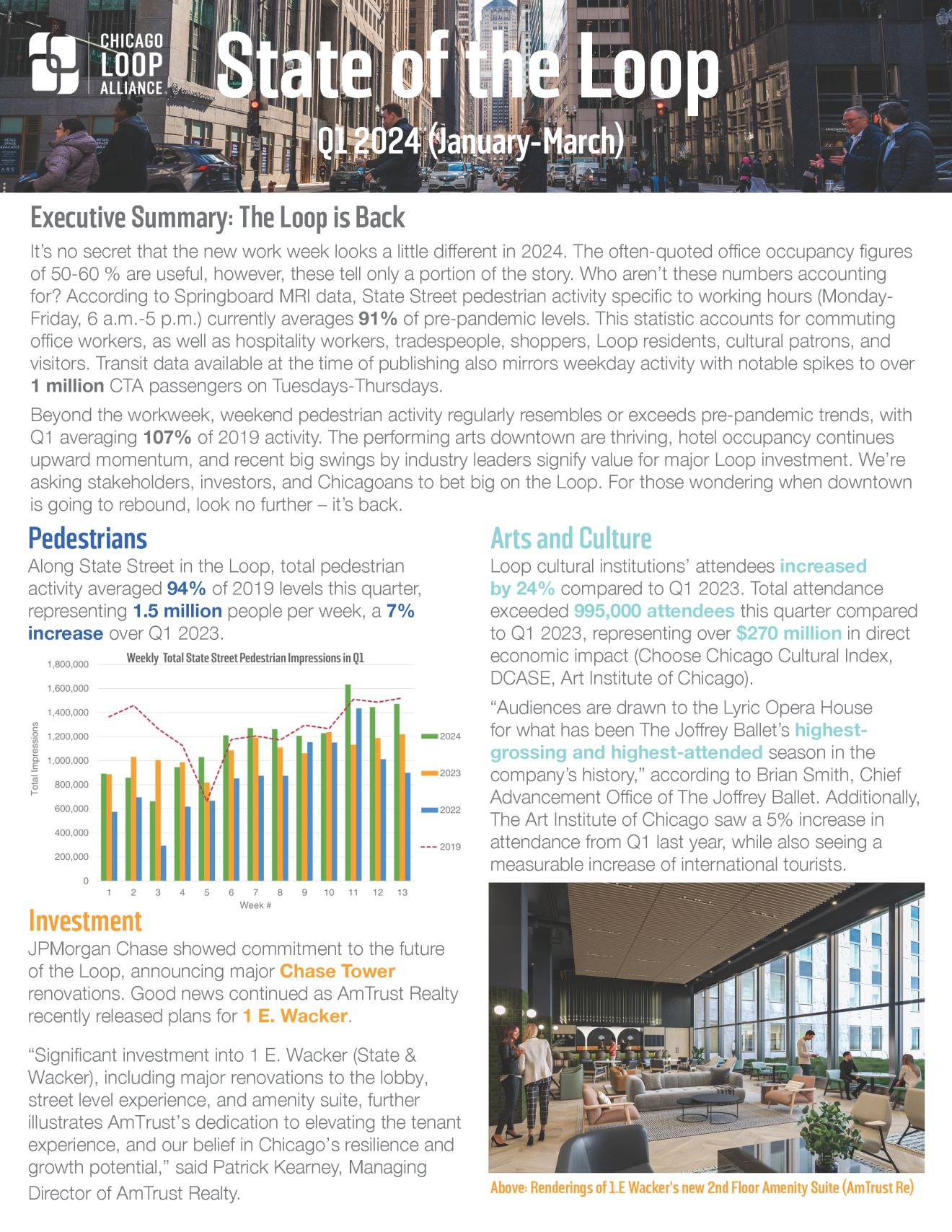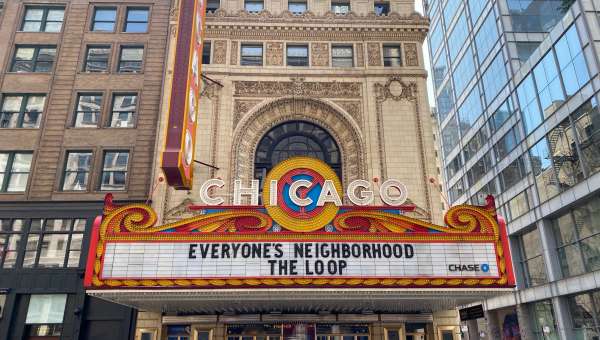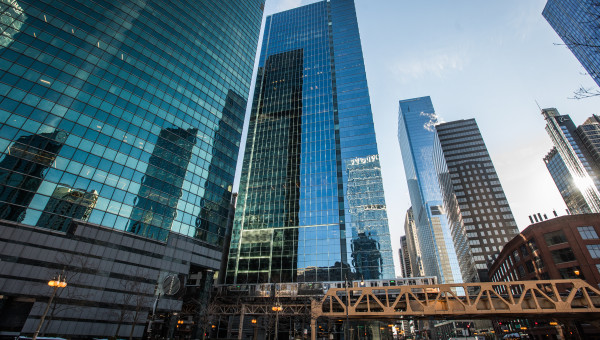Posted 22 months ago in Trending
3 MIN READ -- Chicago Loop Alliance (CLA) released its quarter one 2024 State of the Loop report on downtown activity, using a variety of data sources, which the organization has produced since July 2020. The report tracks pedestrian activity, hotel occupancy, office workers on-site, arts and culture, retail, investment and more. View the quarter one (Jan.-Mar. 2024) State of the Loop report here.
According to Springboard MRI data, when looking at pedestrian activity specific to working hours (Monday-Friday, 6 a.m.-5 p.m.), State Street in the Loop currently averages 91% of 2019 levels. This statistic accounts for commuting office workers, as well as hospitality workers, tradespeople, shoppers, Loop residents, cultural patrons, and visitors. Transit data available at the time of publishing also mirrors weekday activity with notable spikes to over 1 million CTA passengers on Tuesdays-Thursdays.
Beyond the workweek, weekend pedestrian activity regularly resembles or exceeds pre-pandemic trends, with Q1 averaging 107% of 2019 activity.
“The data in this report proves that Chicagoans and visitors still love our great street and are returning in record numbers, but we have to give them a reason to stay,” said Michael Edwards, President and CEO of Chicago Loop Alliance. “The Loop needs more investors to bet big on our district right now. Pedestrian activity, visitor numbers, and residential spending demand are just a few of the data points that support this choice, as do the decisions of smart, forward-thinking companies like Google and JPMorgan Chase.”
Pedestrians
Along State Street in the Loop total pedestrian activity averaged 94% of 2019 levels this quarter, representing 1.5 million impressions per week, a 7% increase over Q1 2023.
Arts and Culture
Loop cultural institutions’ attendees increased by 24% compared to Q1 2023. Total attendance exceeded 995,000 attendees this quarter compared to Q1 2023, representing over $270 million in direct economic impact (Choose Chicago Cultural Index, DCASE, Art Institute of Chicago).
“Audiences are drawn to the Lyric Opera House for The Joffrey Ballet’s highest-grossing and highest-attended season in the company’s history,” according to Brian Smith, Chief Advancement Officer of The Joffrey Ballet. Additionally, The Art Institute of Chicago saw a 5% increase in attendance from Q1 last year, while also seeing a measurable increase of international tourists.
Investment
JPMorgan Chase showed commitment to the future of the Loop with the announcement of major Chase Building renovations, however good news continues; AmTrust Realty recently released plans for 1 E. Wacker (State & Wacker), including major renovations to the lobby, street level experience, and amenity suite. “The significant investment into completely renovating 1 E. Wacker further illustrates AmTrust’s dedication to elevating the tenant experience, and our belief in Chicago’s resilience and growth potential,” said Patrick Kearney, Managing Director of AmTrust Realty.
Office Occupancy
Chicago averaged 56% of pre-pandemic office occupancy during Q1 according to Kastle Systems, remaining at least three points above the 10-city average.
Hotels
A 51% hotel occupancy in the Loop served as the highest rate for a post-pandemic Q1, within 11% of Q1 2019.
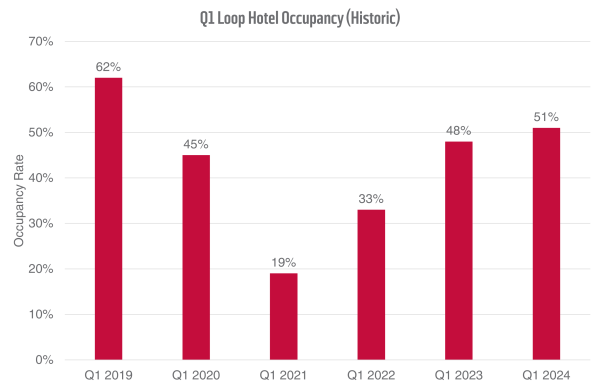
Retail
Exciting new additions are filling out the Loop’s restaurant and bar scene. Industry Ales, the Loop’s newest brewery recently opened on Wabash; and Bar Sotto, a new concept from Italian Village, merging Italian small plates with Chicago dive bar culture plans expansion and further renovations after a successful pilot run.
Though a record high 30 percent retail vacancy rate and a $940 million gap in Loop resident spending potential still plague State Street, weekend pedestrian activity at 107% of 2019 levels signifies the corridor’s capacity. Pedestrian momentum and consumer demand may forecast a radical shift for the Loop’s retail properties.
City Hall’s Big Bet
The much anticipated announcement about LaSalle Street’s major office-to-residential conversion projects came from City Hall in quarter one. These four mixed-use, mixed-income buildings will transform the iconic corridor. This historic investment into revitalizing the Loop adds to the efforts of local stakeholders and community members already working to create a more vibrant and livable neighborhood downtown for everyone.
Methodology
Sources for pedestrian activity provided by Springboard MRI; arts and culture provided by Choose Chicago Cultural Index, Department of Cultural Affairs and Special Events and the Art Institute of Chicago; hotel occupancy provided by Choose Chicago; office occupancy provided by Kastle Systems and Placer.ai; retail vacancy rates provided by Stone Real Estate.

